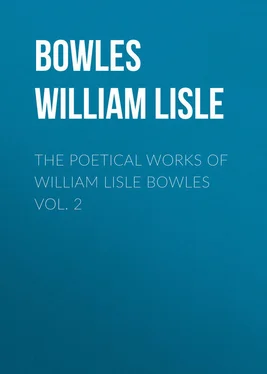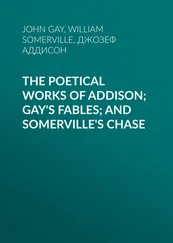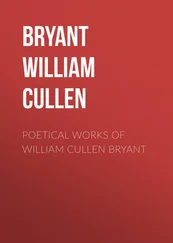William Bowles - The Poetical Works of William Lisle Bowles Vol. 2
Здесь есть возможность читать онлайн «William Bowles - The Poetical Works of William Lisle Bowles Vol. 2» — ознакомительный отрывок электронной книги совершенно бесплатно, а после прочтения отрывка купить полную версию. В некоторых случаях можно слушать аудио, скачать через торрент в формате fb2 и присутствует краткое содержание. ISBN: , Жанр: foreign_antique, foreign_prose, foreign_poetry, на английском языке. Описание произведения, (предисловие) а так же отзывы посетителей доступны на портале библиотеки ЛибКат.
- Название:The Poetical Works of William Lisle Bowles Vol. 2
- Автор:
- Жанр:
- Год:неизвестен
- ISBN:http://www.gutenberg.org/ebooks/32145
- Рейтинг книги:4 / 5. Голосов: 1
-
Избранное:Добавить в избранное
- Отзывы:
-
Ваша оценка:
- 80
- 1
- 2
- 3
- 4
- 5
The Poetical Works of William Lisle Bowles Vol. 2: краткое содержание, описание и аннотация
Предлагаем к чтению аннотацию, описание, краткое содержание или предисловие (зависит от того, что написал сам автор книги «The Poetical Works of William Lisle Bowles Vol. 2»). Если вы не нашли необходимую информацию о книге — напишите в комментариях, мы постараемся отыскать её.
The Poetical Works of William Lisle Bowles Vol. 2 — читать онлайн ознакомительный отрывок
Ниже представлен текст книги, разбитый по страницам. Система сохранения места последней прочитанной страницы, позволяет с удобством читать онлайн бесплатно книгу «The Poetical Works of William Lisle Bowles Vol. 2», без необходимости каждый раз заново искать на чём Вы остановились. Поставьте закладку, и сможете в любой момент перейти на страницу, на которой закончили чтение.
Интервал:
Закладка:
"My heart has thanked thee, Bowles! for those soft strains,
Whose sadness soothes me like the murmuring
Of wild bees in the sunny showers of spring!
For hence, not callous to the mourner's pains,
Through youth's gay prime and thornless paths I went:
And when the mightier throes of mind began,
And drove me forth a thought-bewildered man,
Their mild and manliest melancholy lent
A mingled charm, such as the pang consigned
To slumber, though the big tear it renewed;
Bidding a strange mysterious pleasure brood
Over the wavy and tumultuous mind,
As the Great Spirit erst with plastic sweep
Moved on the darkness of the unformed deep."
His larger poems are perhaps more distinguished by the ambition of their themes than by the success of their treatment. His particular theory about the superiority of the works of nature as poetical subjects perhaps led him to a too uniform selection of its grander features, while undoubtedly his genius fitted him better for depicting its softer and smaller objects. He excels far more in interpreting the language of the bells, now of Ostend, and now of Oxford – in describing the dingles of Coombe Ellen – in echoing the fall of the river Avon, heard in his sick-chamber at Bath – or in catching on his mind-mirror the "Distant View of England from the Sea" – than in coping with the dark recesses of the American forest, following the daring Gama round his Cape of Storms, standing with Noah on the brow of the tremendous mountain Caff, the hill of demons and griffins, and seeing the globe at his feet, or in walking beside the Seer of all time, in that "isle which is called Patmos,"
"Placed far amid the melancholy main."
He is more at home in the beautiful than in the sublime – more a Warton than a Milton – and may be rather likened to a bee murmuring her dim music in the bells of flowers, than to an eagle dallying with the tempest, and binding distant oceans and chains of mountains together by the living link of his swift and strong pinion. Yet his "Spirit of Discovery" contains some bold fancy. Take this, for instance: —
"Andes, sweeping the horizon's tract,
Mightiest of mountains! whose eternal snows
Feel not the nearer sun; whose umbrage chills
The murmuring ocean; whose volcanic fires
A thousand nations view, hung, like the moon,
High in the middle waste of heaven ."
"The Missionary" (of which Byron writes in some playful verses to Murray,
"I've read the Missionary,
Pretty! Very!")
contains much vivid description and interesting narrative; and "St John in Patmos," if scarcely up to the mark of the transcendent theme, has a good deal of picturesque and striking poetry. Perhaps the most interesting of all his minor poems is that entitled "Childe Harold's Last Pilgrimage," quoted, we remember, in Moore's Life of Byron. As proceeding from one whom the angry and unhappy Childe had often insulted in public and laughed at in private, it was as graceful in spirit as it is elegant in composition. "Revenge," it has been said, "is a feast for the gods;" and the saying is true if meant of that species of revenge which gains its end by forgiveness. An act so noble and generous as the writing of this, is calculated to set the memory of Bowles still higher than all his poetry.
BANWELL HILL; A LAY OF THE SEVERN SEA
PREFACE. 1 1 This poem, published in 1829, was dedicated to Dr Henry Law, the Bishop of Bath and Wells.
The estimation of a Poem of this nature must depend, first, on its arrangement, plan, and disposition; secondly, on the judgment, propriety, and feeling with which – in just and proper succession and relief – picture, pathos, moral and religious reflections, historical notices, or affecting incidents, are interwoven. The reader will, in the next place, attend to the versification, or music, in which the thoughts are conveyed. Shakspeare and Milton are the great masters of the verse I have adopted. But who can be heard after them? The reader, however, will at least find no specimens of sonorous harmony ending with such significant words as "of," "and," "if," "but," etc of which we have had lately some splendid examples. I would therefore only request of him to observe, that when such passages occur in this poem as "vanishing," "hush!" etc. it was from design, and not from want of ear. 2 2 Of blank verse of the kind to which I have alluded, I am tempted to give a specimen: — "'Twas summer, and we sailed to Greenwich in A four-oared boat. The sun was shining, and The scenes delightful; while we gazed on The river winding, till we landed at The Ship."
An intermixture of images and characters from common life might be thought, at first sight, out of keeping with the higher tone of general colouring; but the interspersion of the comic, provided the due mock-heroic stateliness be kept up in the language, has often the effect of light and shade, as will be apparent on looking at Cowper's exquisite "Task," although he has often "offended against taste." The only difficulty is happily to steer "from grave to gay."
So far respecting the plan, the execution, the versification, and style. As to the sentiments conveyed in this poem, and in the notes, I must explicitly declare, that when I am convinced, as a clergyman and a magistrate, that there has been an increase of crime, owing, among other causes, to the system pursued by some "nominal Christians," who will not preach "these three" (faith, hope, and charity) according to the order of St Paul, but keep two of these graces, and the greatest of all, out of sight, upon any human plea or pretension; when they do not preach, "Add to your faith virtue;" when they will not preach, Christ died for the sins of "the world , and not for ours only;" when, from any pleas of their own, or persuaded by any sophistry or faction, they become, most emphatically, "dumb dogs" to the sublime and affecting moral parts of that gospel which they have engaged before God to deliver; and above all, when crimes, as I am verily persuaded have been, are, and must be, the consequence of such public preaching, – leaving others to "stand or fall" to their own God; I shall be guided by my own understanding, and the plain Word of God, as I find it earnestly, simply, beautifully, and divinely set before me by Christ and his Apostles; and so feeling, I shall as fearlessly deliver my own opinions, being assured, whether popular or unpopular, whether they offend this man or that, this sect or that sect, they will not easily be shaken.
I might ask, why did St Paul add, so emphatically, "these three," when he enumerated the Christian graces? Doubtless, because he thought the distinction very important. Why did St Peter say, "Add to your faith virtue"? Because he thought it equally important and essential. Why did St John say, "Christ died for the sins of the whole world, and not for ours only"? Because he thought it equally important and necessary.
Never omitting the atonement, justification by faith, the fruits of the Spirit, and never separating faith from its hallowed fellowship, we shall find all other parts of the gospel unite in harmonious subordination; but if we shade the moral parts down, leave them out, contradict them, by insidious sophistry, the Scripture, so far from being "rightly divided," will be discordant and clashing. The man, be he whom he may, who preaches "faith" without charity; who preaches "faith without virtue," is as pernicious and false an expounder of the divine message, as he who preaches "good works," without their legitimate and only foundation – Christian faith.
Читать дальшеИнтервал:
Закладка:
Похожие книги на «The Poetical Works of William Lisle Bowles Vol. 2»
Представляем Вашему вниманию похожие книги на «The Poetical Works of William Lisle Bowles Vol. 2» списком для выбора. Мы отобрали схожую по названию и смыслу литературу в надежде предоставить читателям больше вариантов отыскать новые, интересные, ещё непрочитанные произведения.
Обсуждение, отзывы о книге «The Poetical Works of William Lisle Bowles Vol. 2» и просто собственные мнения читателей. Оставьте ваши комментарии, напишите, что Вы думаете о произведении, его смысле или главных героях. Укажите что конкретно понравилось, а что нет, и почему Вы так считаете.












